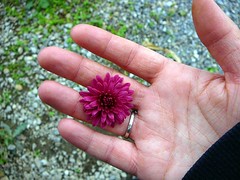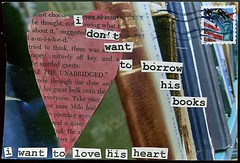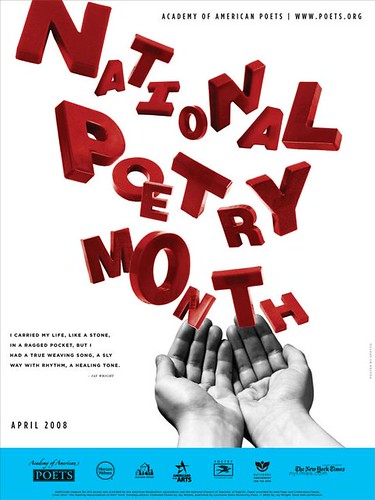
Monday, April 7
It's National Poetry Month!
I know I should be all ambitious and try to post a new poem every day for the month of April, but I don't have that much energy, and if you want a poem a day, you can go to this convenient link: click.


Thursday, April 3
Passing Afternoon
I love it when song lyrics can be classified as poetry. Here is a video that is NOT MINE, but the background music is the song below. Courtesy of YouTube user 79cd36.
I just realized that I love this song because it has whispers of my mother in it.
Passing Afternoon
by Iron & Wine
There are times that walk from you
Like some passing afternoon
Summer warmed the open window of her honeymoon
And she chose a yard to burn
But the ground remembers her
Wooden spoons, her children stir her Bougainvillea blooms
There are things that drift away
Like our endless numbered days
Autumn blew the quilt right off the perfect bed she made
And she's chosen to believe
In the hymns her mother sings
Sunday pulls its children from their piles of fallen leaves
There are sailing ships that pass
All our bodies in the grass
Springtime calls her children until she lets them go at last
And she's chosen where to be
Though she's lost her wedding ring
Somewhere near her misplaced jar of Bougainvillea seeds
There are things we can't recall
Blind as night that finds us all
Winter tucks her children in, her fragile china dolls
But my hands remember hers
Rolling around the shaded ferns
Naked arms, her secrets still like songs I'd never learned
There are names across the sea
Only now I do believe
Sometimes, with the window closed, she'll sit and think of me
But she'll mend his tattered clothes
And they'll kiss as if they know
A baby sleeps in all our bones, so scared to be alone
I just realized that I love this song because it has whispers of my mother in it.
Passing Afternoon
by Iron & Wine
There are times that walk from you
Like some passing afternoon
Summer warmed the open window of her honeymoon
And she chose a yard to burn
But the ground remembers her
Wooden spoons, her children stir her Bougainvillea blooms
There are things that drift away
Like our endless numbered days
Autumn blew the quilt right off the perfect bed she made
And she's chosen to believe
In the hymns her mother sings
Sunday pulls its children from their piles of fallen leaves
There are sailing ships that pass
All our bodies in the grass
Springtime calls her children until she lets them go at last
And she's chosen where to be
Though she's lost her wedding ring
Somewhere near her misplaced jar of Bougainvillea seeds
There are things we can't recall
Blind as night that finds us all
Winter tucks her children in, her fragile china dolls
But my hands remember hers
Rolling around the shaded ferns
Naked arms, her secrets still like songs I'd never learned
There are names across the sea
Only now I do believe
Sometimes, with the window closed, she'll sit and think of me
But she'll mend his tattered clothes
And they'll kiss as if they know
A baby sleeps in all our bones, so scared to be alone
Wednesday, March 19
Two Countries
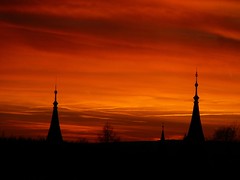
(Sokolov, Czech Republic, Fall 2007)
Two Countries
by Naomi Shihab Nye
Skin remembers how long the years grow
when skin is not touched, a gray tunnel
of singleness, feather lost from the tail
of a bird, swirling onto a step,
swept away by someone who never saw
it was a feather. Skin ate, walked,
slept by itself, knew how to raise a
see-you-later hand. But skin felt
it was never seen, never known as
a land on the map, nose like a city,
hip like a city, gleaming dome of the mosque
and the hundred corridors of cinnamon and rope.
Skin had hope, that's what skin does.
Heals over the scarred place, makes a road.
Love means you breathe in two countries.
And skin remembers--silk, spiny grass,
deep in the pocket that is skin's secret own.
Even now, when skin is not alone,
it remembers being alone and thanks something larger
that there are travelers, that people go places
larger than themselves.
Tuesday, February 5
Equally Skilled
This is a song by Jon Foreman, lead singer of Switchfoot, from his Fall-EP.
Equally Skilled
from Micah 7:1-9
How miserable I am.
I feel like a fruit-picker who arrived here
after the harvest.
There's nothing here at all,
nothing at all here that could placate my hunger.
The godly people are all gone;
there's not one honest soul left alive
here on the planet.
We're all murderers and thieves,
setting traps here for even our brothers.
And both of our hands are equally skilled
at doing evil, equally skilled;
at bribing the judges, equally skilled;
at perverting justice;
both of our hands,
both of our hands.
The day of justice comes
and is even now swiftly arriving.
Don't trust anyone at all;
not your best friend or even your wife.
For the son hates the father;
the daughter despises even her mother.
Look, your enemies arrive
right in the room of your very household.
And both of their hands are equally skilled
at doing evil, equally skilled;
at bribing the judges, equally skilled;
at perverting justice;
both of their hands,
both of their hands.
No, don't gloat over me.
Though I fall, though I fall,
I will rise again.
Though I sit here in darkness,
the Lord, the Lord alone--
He will be my light.
I will be patient as the Lord
punishes me for the wrongs I've done against Him.
After that, He'll take my case,
bringing me to light and the justice
for all I have suffered.
And both of His hands
are equally skilled
at ruining evil, equally skilled;
at judging the judges, equally skilled;
administering justice,
both of His hands,
both of His hands
are equally skilled
at showing me mercy, equally skilled;
at loving the loveless, equally skilled;
administering justice;
both of His hands,
both of His hands.
Equally Skilled
from Micah 7:1-9
How miserable I am.
I feel like a fruit-picker who arrived here
after the harvest.
There's nothing here at all,
nothing at all here that could placate my hunger.
The godly people are all gone;
there's not one honest soul left alive
here on the planet.
We're all murderers and thieves,
setting traps here for even our brothers.
And both of our hands are equally skilled
at doing evil, equally skilled;
at bribing the judges, equally skilled;
at perverting justice;
both of our hands,
both of our hands.
The day of justice comes
and is even now swiftly arriving.
Don't trust anyone at all;
not your best friend or even your wife.
For the son hates the father;
the daughter despises even her mother.
Look, your enemies arrive
right in the room of your very household.
And both of their hands are equally skilled
at doing evil, equally skilled;
at bribing the judges, equally skilled;
at perverting justice;
both of their hands,
both of their hands.
No, don't gloat over me.
Though I fall, though I fall,
I will rise again.
Though I sit here in darkness,
the Lord, the Lord alone--
He will be my light.
I will be patient as the Lord
punishes me for the wrongs I've done against Him.
After that, He'll take my case,
bringing me to light and the justice
for all I have suffered.
And both of His hands
are equally skilled
at ruining evil, equally skilled;
at judging the judges, equally skilled;
administering justice,
both of His hands,
both of His hands
are equally skilled
at showing me mercy, equally skilled;
at loving the loveless, equally skilled;
administering justice;
both of His hands,
both of His hands.
Thursday, January 24
A Tribute to Wendell Berry
I think in the past I had run across a poem or two of Wendell Berry's in some anthology or another, but I had never stopped to drink in his poetry as it deserves. I was reminded of him by a blog I frequent whose writers moved to the country and started a small farm, mostly because of the inspiration of his work. And it is indeed beautiful.

(photo courtesy of flickr user "Fort Photo")
The Peace of Wild Things
by Wendell Berry
When despair grows in me
and I wake in the middle of the night at the least sound
in fear of what my life and my children's lives may be,
I go and lie down where the wood drake
rests in his beauty on the water, and the great heron feeds.
I come into the peace of wild things
who do not tax their lives with forethought
of grief. I come into the presence of still water.
And I feel above me the day-blind stars
waiting for their light. For a time
I rest in the grace of the world, and am free.
What We Need Is Here
by Wendell Berry
Geese appear high over us,
pass, and the sky closes. Abandon,
as in love or sleep, holds
them to their way, clear
in the ancient faith: what we need
is here. And we pray, not
for new earth or heaven, but to be
quiet in heart, and in eye,
clear. What we need is here.
Water
by Wendell Berry
I was born in a drought year. That summer
my mother waited in the house, enclosed
in the sun and the dry ceaseless wind,
for the men to come back in the evenings,
bringing water from a distant spring.
Veins of leaves ran dry, roots shrank.
And all my life I have dreaded the return
of that year, sure that it still is
somewhere, like a dead enemy's soul.
Fear of dust in my mouth is always with me,
and I am the faithful husband of the rain,
I love the water of wells and springs
and the taste of roofs in the water of cisterns.
I am a dry man whose thirst is praise
of clouds, and whose mind is something of a cup.
My sweetness is to wake in the night
after days of dry heat, hearing the rain.

(photo courtesy of flickr user "Fort Photo")
The Peace of Wild Things
by Wendell Berry
When despair grows in me
and I wake in the middle of the night at the least sound
in fear of what my life and my children's lives may be,
I go and lie down where the wood drake
rests in his beauty on the water, and the great heron feeds.
I come into the peace of wild things
who do not tax their lives with forethought
of grief. I come into the presence of still water.
And I feel above me the day-blind stars
waiting for their light. For a time
I rest in the grace of the world, and am free.
What We Need Is Here
by Wendell Berry
Geese appear high over us,
pass, and the sky closes. Abandon,
as in love or sleep, holds
them to their way, clear
in the ancient faith: what we need
is here. And we pray, not
for new earth or heaven, but to be
quiet in heart, and in eye,
clear. What we need is here.
Water
by Wendell Berry
I was born in a drought year. That summer
my mother waited in the house, enclosed
in the sun and the dry ceaseless wind,
for the men to come back in the evenings,
bringing water from a distant spring.
Veins of leaves ran dry, roots shrank.
And all my life I have dreaded the return
of that year, sure that it still is
somewhere, like a dead enemy's soul.
Fear of dust in my mouth is always with me,
and I am the faithful husband of the rain,
I love the water of wells and springs
and the taste of roofs in the water of cisterns.
I am a dry man whose thirst is praise
of clouds, and whose mind is something of a cup.
My sweetness is to wake in the night
after days of dry heat, hearing the rain.
Monday, January 7
The Darkling Thrush

(photo courtesy of flickr user "roadsidephotos")
The Darkling Thrush
by Thomas Hardy
I leant upon a coppice gate
When Frost was spectre-gray,
And Winter's dregs made desolate
The weakening eye of day.
The tangled bine-stems scored the sky
Like strings of broken lyres,
And all mankind that haunted nigh
Had sought their household fires.
The land's sharp features seemed to be
The Century's corpse outleant,
His crypt the cloudy canopy,
The wind his death-lament.
The ancient pulse of germ and birth
Was shrunken hard and dry,
And every spirit upon earth
Seemed fervourless as I.
At once a voice arose among
The bleak twigs overhead
In a full-hearted evensong
Of joy illimited;
An aged thrush, frail, gaunt, and small,
In blast-beruffled plume,
Had chosen thus to fling his soul
Upon the growing gloom.
So little cause for carolings
Of such ecstatic sound
Was written on terrestrial things
Afar or nigh around,
That I could think there trembled through
His happy good-night air
Some blessed Hope, whereof he knew
And I was unaware.
Sunday, December 23
The Mystic's Christmas

The Mystic's Christmas
by John Greenleaf Whittier
"All hail!" the bells of Christmas rang,
"All hail!" the monks at Christmas sang,
The merry monks who kept with cheer
The gladdest day of all their year.
But still apart, unmoved thereat,
A pious elder brother sat
Silent, in his accustomed place,
With God's sweet peace upon his face.
"Why sitt'st thou thus?" his brethren cried,
"It is the blessed Christmas-tide;
The Christmas lights are all aglow,
The sacred lilies bud and blow.
"Above our heads the joy-bells ring,
Without the happy children sing,
And all God's creatures hail the morn
On which the holy Christ was born.
"Rejoice with us; no more rebuke
Our gladness with thy quiet look."
The gray monk answered, "Keep, I pray,
Even as ye list, the Lord's birthday.
"Let heathen Yule fires flicker red
Where thronged refectory feasts are spread;
With mystery-play and masque and mime
And wait-songs speed the holy time!
"The blindest faith may haply save;
The Lord accepts the things we have;
And reverence, howsoe'er it strays,
May find at last the shining ways.
"They needs must grope who cannot see,
The blade before the ear must be;
As ye are feeling I have felt,
And where ye dwell I too have dwelt.
"But now, beyond the things of sense,
Beyond occasions and events,
I know, through God's exceeding grace,
Release from form and time and space.
"I listen, from no mortal tongue,
To hear the song the angels sung;
And wait within myself to know
The Christmas lilies bud and blow.
"The outward symbols disappear
From him whose inward sight is clear;
And small must be the choice of days
To him who fills them all with praise!
"Keep while you need it, brothers mine,
With honest seal your Christmas sign,
But judge not him who every morn
Feels in his heart the Lord Christ born!"
Tuesday, December 4
The Trumpet Child

(photo courtesy of flickr user "mrittenhouse")
A song I've been listening to recently.
The Trumpet Child
by Over the Rhine
The trumpet child will blow his horn
Will blast the sky till it’s reborn
With Gabriel’s power and Satchmo’s grace
He will surprise the human race
The trumpet he will use to blow
Is being fashioned out of fire
The mouthpiece is a glowing coal
The bell a burst of wild desire
The trumpet child will riff on love
Thelonious notes from up above
He’ll improvise a kingdom come
Accompanied by a different drum
The trumpet child will banquet here
Until the lost are truly found
A thousand days, a thousand years
Nobody knows for sure how long
The rich forget about their gold
The meek and mild are strangely bold
A lion lies beside a lamb
And licks a murderer’s outstretched hand
The trumpet child will lift a glass
His bride now leaning in at last
His final aim to fill with joy
The earth that man all but destroyed
Monday, December 3
Song for a Winter's Night

(photo courtesy of flickr user "Vangral")
Song for a Winter's Night
by Sarah McLachlan
the lamp is burning low upon my tabletop
the snow is softly falling
the air is still within the silence of my room
i hear your voice softly calling
if i could only have you near
to breathe a sigh or two
i would be happy just to hold the hands i love
upon this winter's night with you
the smoke is rising in the shadows overhead
my glass is almost empty
i read again between the lines upon the page
the words of love you sent me
if i could know within my heart
that you were lonely too
i would be happy just to hold the hands i love
upon this winter's night with you
the fire is dying now, the lamp is growing dim
the shades of night are lifting
the morning light steals across my windowpane
where webs of snow are drifting
if i could only have you near
to breathe a sigh or two
i would be happy just to hold the hands i love
and to be once again with you
to be once again with you
Sunday, November 18
Always the Peace of the Train

Loket, Czech Republic, October 2007
Always the Peace of the Train
always the peace of the train
before the screech and the rush
of the disbanding, demanding
head counts, rendezvous;
before anticipation of the destination
becomes the fruit of the here and now
when your common ground
is the earth rolling out
from under you and all of them
all breathe the same air
all hear the music of the sway of the rails
always the peace of the train
after tears and the drying of tears
the accomplishment, abandonment,
whatever purpose fulfilled
after satisfaction of the obligation
dissolves in the eyes of the homeward bound
when your common ground
is the earth rolling out
from under you and all of them
all breathe the same air
all hear the music of the sway of the rails
always the peace of the train
11.18.07
c.l.l.
Sunday, October 28
November

(photo courtesy of flickr user Peter Erik Forsberg)
November
by Walter de la Mare
There is wind where the rose was,
Cold rain where sweet grass was,
And clouds like sheep
Stream o'er the steep
Grey skies where the lark was.
Nought warm where your hand was,
Nought gold where your hair was,
But phantom, forlorn,
Beneath the thorn,
Your ghost where your face was.
Cold wind where your voice was,
Tears, tears where my heart was,
And ever with me,
Child, ever with me,
Silence where hope was.
Saturday, October 13
Moving Forward

(photo courtesy of flickr user "M. Gruber")
Moving Forward
by Rainer Maria Rilke
The deep parts of my life pour onward,
as if the river shores were opening out.
It seems that things are more like me now,
That I can see farther into paintings.
I feel closer to what language can't reach.
With my senses, as with birds, I climb
into the windy heaven, out of the oak,
in the ponds broken off from the sky
my falling sinks, as if standing on fishes.
Monday, September 10
A Better Resurrection
If someone could explain why the first stanza of this poem is being attributed to Sylvia Plath on several credible websites, I'd be happy to know. I think Rossetti is a safer bet.
A Better Resurrection
by Christina Rossetti
I have no wit, no words, no tears;
My heart within me like a stone
Is numb'd too much for hopes or fears;
Look right, look left, I dwell alone;
I lift mine eyes, but dimm'd with grief
No everlasting hills I see;
My life is in the falling leaf:
O Jesus, quicken me.
My life is like a faded leaf,
My harvest dwindled to a husk:
Truly my life is void and brief
And tedious in the barren dusk;
My life is like a frozen thing,
No bud nor greenness can I see:
Yet rise it shall--the sap of Spring;
O Jesus, rise in me.
My life is like a broken bowl,
A broken bowl that cannot hold
One drop of water for my soul
Or cordial in the searching cold;
Cast in the fire the perish'd thing;
Melt and remould it, till it be
A royal cup for Him, my King:
O Jesus, drink of me
A Better Resurrection
by Christina Rossetti
I have no wit, no words, no tears;
My heart within me like a stone
Is numb'd too much for hopes or fears;
Look right, look left, I dwell alone;
I lift mine eyes, but dimm'd with grief
No everlasting hills I see;
My life is in the falling leaf:
O Jesus, quicken me.
My life is like a faded leaf,
My harvest dwindled to a husk:
Truly my life is void and brief
And tedious in the barren dusk;
My life is like a frozen thing,
No bud nor greenness can I see:
Yet rise it shall--the sap of Spring;
O Jesus, rise in me.
My life is like a broken bowl,
A broken bowl that cannot hold
One drop of water for my soul
Or cordial in the searching cold;
Cast in the fire the perish'd thing;
Melt and remould it, till it be
A royal cup for Him, my King:
O Jesus, drink of me
Tuesday, September 4
Dancing Around You

photo courtesy of flickr user "tavopp"
Dancing Around You
dancing around you like a child
around a flame
around a bubble
everything you could mean
is too fragile still, dangerous,
and silent.
dancing around you like a child
in the music
in the hope
everything you could mean
is the falsetto note
that turns my heart
into a ringing well.
dancing around you like a child
through the sunrise
through the wet laundry
everything you could mean
runs like fresh water
into a cold glass to have
and to hold.
c.l.l.
9.3.07
Wednesday, August 8
Advice to a Girl
by Sara Teasdale
No one worth possessing
Can be quite possessed;
Lay that on your heart,
My young angry dear;
This truth, this hard and precious stone,
Lay it on your hot cheek,
Let it hide your tear.
Hold it like a crystal
When you are alone
And gaze in the depths of the icy stone.
Long, look long and you will be blessed:
No one worth possessing
Can be quite possessed.
No one worth possessing
Can be quite possessed;
Lay that on your heart,
My young angry dear;
This truth, this hard and precious stone,
Lay it on your hot cheek,
Let it hide your tear.
Hold it like a crystal
When you are alone
And gaze in the depths of the icy stone.
Long, look long and you will be blessed:
No one worth possessing
Can be quite possessed.
Sunday, July 15
Flare
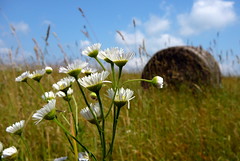
c.l.l., june 2007, potter county, pennsylvania
Canto 12 of "Flare" by Mary Oliver.
When loneliness comes stalking, go into the fields, consider
the orderliness of the world. Notice
something you have never noticed before,
like the tambourine sound of the snow-cricket
whose pale green body is no longer than your thumb.
Stare hard at the hummingbird, in the summer rain,
shaking the water-sparks from its wings.
Let grief be your sister, she will whether or no.
Rise up from the stump of sorrow, and be green also,
like the diligent leaves.
A lifetime isn't long enough for the beauty of this world
and the responsibilities of your life.
Scatter your flowers over the graves, and walk away.
Be good-natured and untidy in your exuberance.
In the glare of your mind, be modest.
And beholden to what is tactile, and thrilling.
Live with the beetle, and the wind.
This is the dark bread of the poem.
This is the dark and nourishing bread of the poem.
Wednesday, July 11
My Hope Is Built On Nothing Less
by William Bradbury and Edward Mote
My hope is built on nothing less
than Jesus' blood and righteousness;
I dare not trust the sweetest frame,
but wholly lean on Jesus' name.
On Christ the solid rock I stand;
all other ground is sinking sand;
all other ground is sinking sand.
When darkness seems to hide his face,
I rest on his unchanging grace.
In every high and stormy gale,
my anchor holds within the vale.
His oath, his covenant, his blood
support me in the whelming flood.
When all around my soul gives way,
he then is all my hope and stay.
When he shall come with trumpet sound,
O may I then in him be found,
dressed in his righteousness alone,
faultless to stand before the throne.
On Christ the solid rock I stand;
all other ground is sinking sand;
all other ground is sinking sand.
My hope is built on nothing less
than Jesus' blood and righteousness;
I dare not trust the sweetest frame,
but wholly lean on Jesus' name.
On Christ the solid rock I stand;
all other ground is sinking sand;
all other ground is sinking sand.
When darkness seems to hide his face,
I rest on his unchanging grace.
In every high and stormy gale,
my anchor holds within the vale.
His oath, his covenant, his blood
support me in the whelming flood.
When all around my soul gives way,
he then is all my hope and stay.
When he shall come with trumpet sound,
O may I then in him be found,
dressed in his righteousness alone,
faultless to stand before the throne.
On Christ the solid rock I stand;
all other ground is sinking sand;
all other ground is sinking sand.
Sunday, June 3
Happiness

(photo courtesy of flickr user "lanier67")
This poem was recently referenced by a friend of mine on her blog, and I immediately fell in love with it. It's a joy to find the rare poem that deals with joy with the same zeal and precision as usually describes pain and sorrow. It takes effort to find happiness, because it usually means looking beyond ourselves, but how sweet the reward when we do.
Happiness
by Jane Kenyon
There’s just no accounting for happiness,
or the way it turns up like a prodigal
who comes back to the dust at your feet
having squandered a fortune far away.
And how can you not forgive?
You make a feast in honor of what
was lost, and take from its place the finest
garment, which you saved for an occasion
you could not imagine, and you weep night and day
to know that you were not abandoned,
that happiness saved its most extreme form
for you alone.
No, happiness is the uncle you never
knew about, who flies a single-engine plane
onto the grassy landing strip, hitchhikes
into town, and inquires at every door
until he finds you asleep midafternoon
as you so often are during the unmerciful
hours of your despair.
It comes to the monk in his cell.
It comes to the woman sweeping the street
with a birch broom, to the child
whose mother has passed out from drink.
It comes to the lover, to the dog chewing
a sock, to the pusher, to the basketmaker,
and to the clerk stacking cans of carrots
in the night.
It even comes to the boulder
in the perpetual shade of pine barrens,
to rain falling on the open sea,
to the wineglass, weary of holding wine.
Saturday, April 21
Joseph Cornell, With Box
I've read this through only once, but its use of language and meter captivated me. Enjoy. (Found on Poets.org.)
Joseph Cornell, With Box
by Michael Dumanis
World harbors much I'd like to fit inside
that the parameters preclude me from.
I'm the desire to have had a say.
I'm the desire to be left alone
amid brochures for Europe's best hotels
behind a locked door on Utopia Parkway,
where Brother, crippled, rides his chariot,
where Mother's all dressed up and going nowhere.
Together, sotto voce, we count hours,
fuss over newsprint, water down the wine.
When I was shorter, we were all divine.
When I was shorter, I was infinite
and felt less fear of being understood.
I am the fear of being understood.
I am the modest Joe who hems and haws
at blond cashiers ensconced in ticket booths.
Lacking the words to offer her the flowers
I'd spent a fortnight locating the words
to offer her, I threw the flowers at her.
As penance, I entrenched you, Doll, in wood.
Through your shaved bark and twigs, you stared at me.
Being a woman was out of the question.
Being a question caused women to wonder.
How unrestrained you must feel, Wind and Water.
You are the obligation, Box, to harbor
each disarray and ghost. I am the author,
the authored by. I am a plaything of.
Who makes who Spectacle. Who gives whom Order.
My father was a man who lived and died.
He would commute from Nyack to New York.
The woolen business had its ups and downs.
How unrestrained you've become, Cage and Coffin.
There is an order to each spectacle.
You are the obligation, Wind, to sunder
this relic of. Am reliquary for
the off-white light of January morning.
Have seen you, Fairies, in your apricot
and chestnut negligees invade the mirror,
tiptoe on marbles, vanish from the scene.
Am reliquary for what World has seen.
I'm the ballet of wingspan, the cracked mirror.
Canary's coffin. Sunshine breaking through.
Joseph Cornell, With Box
by Michael Dumanis
World harbors much I'd like to fit inside
that the parameters preclude me from.
I'm the desire to have had a say.
I'm the desire to be left alone
amid brochures for Europe's best hotels
behind a locked door on Utopia Parkway,
where Brother, crippled, rides his chariot,
where Mother's all dressed up and going nowhere.
Together, sotto voce, we count hours,
fuss over newsprint, water down the wine.
When I was shorter, we were all divine.
When I was shorter, I was infinite
and felt less fear of being understood.
I am the fear of being understood.
I am the modest Joe who hems and haws
at blond cashiers ensconced in ticket booths.
Lacking the words to offer her the flowers
I'd spent a fortnight locating the words
to offer her, I threw the flowers at her.
As penance, I entrenched you, Doll, in wood.
Through your shaved bark and twigs, you stared at me.
Being a woman was out of the question.
Being a question caused women to wonder.
How unrestrained you must feel, Wind and Water.
You are the obligation, Box, to harbor
each disarray and ghost. I am the author,
the authored by. I am a plaything of.
Who makes who Spectacle. Who gives whom Order.
My father was a man who lived and died.
He would commute from Nyack to New York.
The woolen business had its ups and downs.
How unrestrained you've become, Cage and Coffin.
There is an order to each spectacle.
You are the obligation, Wind, to sunder
this relic of. Am reliquary for
the off-white light of January morning.
Have seen you, Fairies, in your apricot
and chestnut negligees invade the mirror,
tiptoe on marbles, vanish from the scene.
Am reliquary for what World has seen.
I'm the ballet of wingspan, the cracked mirror.
Canary's coffin. Sunshine breaking through.
Sunday, March 4
What the Dog Perhaps Hears
I'm on a Lisel Mueller kick. I've recently discovered more of her work, and I really, really like it. She is one of the poets to whose talents I aspire.

Toby
What the Dog Perhaps Hears
by Lisel Mueller
If an inaudible whistle
blown between our lips
can send him home to us,
then silence is perhaps
the sound of spiders breathing
and roots mining the earth;
it may be asparagus heaving,
headfirst, into the light
and the long brown sound
of cracked cups, when it happens.
We would like to ask the dog
if there is a continuous whir
because the child in the house
keeps growing, if the snake
really stretches full length
without a click and the sun
breaks through clouds without
a decibel of effort,
whether in autumn, when the trees
dry up their wells, there isn't a shudder
too high for us to hear.
What is it like up there
above the shut-off level
of our simple ears?
For us there was no birth cry,
the newborn bird is suddenly here,
the egg broken, the nest alive,
and we heard nothing when the world changed.

Toby
What the Dog Perhaps Hears
by Lisel Mueller
If an inaudible whistle
blown between our lips
can send him home to us,
then silence is perhaps
the sound of spiders breathing
and roots mining the earth;
it may be asparagus heaving,
headfirst, into the light
and the long brown sound
of cracked cups, when it happens.
We would like to ask the dog
if there is a continuous whir
because the child in the house
keeps growing, if the snake
really stretches full length
without a click and the sun
breaks through clouds without
a decibel of effort,
whether in autumn, when the trees
dry up their wells, there isn't a shudder
too high for us to hear.
What is it like up there
above the shut-off level
of our simple ears?
For us there was no birth cry,
the newborn bird is suddenly here,
the egg broken, the nest alive,
and we heard nothing when the world changed.
Friday, March 2
Moon Fishing
I keep books of poetry as close to me as I keep my Bible. Always on my nightstand, two Bibles, one anthology. One Bible, two anthologies. Always. I don't think it's wrong or even sacrilegious. I think it was intended.
This poem might do something to explain why.

(photo courtesy of flickr user pretorious_photography)
Moon Fishing
by Lisel Mueller
When the moon was full they came to the water,
some with pitchforks, some with rakes,
some with sieves and ladles,
and one with a silver cup.
And they fished till a traveler passed them and said,
"Fools,
to catch the moon you must let your women
spread their hair on the water--
even the wily moon will leap to that bobbing
net of shimmering threads,
gasp and flop till its silver scales
lie black and still at your feet."
And they fished with the hair of their women
till a traveler passed them and said,
"Fools,
do you think the moon is caught lightly,
with glitter and silk threads?
You must cut out your hearts and bait your hooks
with those dark animals;
what matter you lose your hearts to reel in your dream?"
And they fished with their tight, hot hearts
till a traveler passed them and said,
"Fools,
what good is the moon to a heartless man?
Put back your hearts and get on your knees
and drink as you never have,
until your throats are coated with silver
and your voices ring like bells."
And they fished with their lips and tongues
until the water was gone
and the moon had slipped away
in the soft, bottomless mud.
This poem might do something to explain why.

(photo courtesy of flickr user pretorious_photography)
Moon Fishing
by Lisel Mueller
When the moon was full they came to the water,
some with pitchforks, some with rakes,
some with sieves and ladles,
and one with a silver cup.
And they fished till a traveler passed them and said,
"Fools,
to catch the moon you must let your women
spread their hair on the water--
even the wily moon will leap to that bobbing
net of shimmering threads,
gasp and flop till its silver scales
lie black and still at your feet."
And they fished with the hair of their women
till a traveler passed them and said,
"Fools,
do you think the moon is caught lightly,
with glitter and silk threads?
You must cut out your hearts and bait your hooks
with those dark animals;
what matter you lose your hearts to reel in your dream?"
And they fished with their tight, hot hearts
till a traveler passed them and said,
"Fools,
what good is the moon to a heartless man?
Put back your hearts and get on your knees
and drink as you never have,
until your throats are coated with silver
and your voices ring like bells."
And they fished with their lips and tongues
until the water was gone
and the moon had slipped away
in the soft, bottomless mud.
Tuesday, February 27
Hope

Hope
by Lisel Mueller
It hovers in dark corners
before the lights are turned on,
it shakes sleep from its eyes
and drops from mushroom gills,
it explodes in the starry heads
of dandelions turned sages,
it sticks to the wings of green angels
that sail from the tops of maples.
It sprouts in each occluded eye
of the many-eyed potato,
it lives in each earthworm segment
surviving cruelty,
it is the motion that runs
from the eyes to the tail of a dog,
it is the mouth that inflates the lungs
of the child that has just been born.
It is the singular gift
we cannot destroy in ourselves,
the argument that refutes death,
the genius that invents the future,
all we know of God.
It is the serum which makes us swear
not to betray one another;
it is in this poem, trying to speak.
__________________________________________
it glistens on the petals of the pansies in the snow-frosted greenhouse...
Wednesday, February 14
Valentine's Day
Rarely are poems so joyously beautiful as those written about love. Only something we do not understand could bring us so much feeling. Here are two lovely ones I found.
Happy Valentine's Day

When You Are Old
by W.B. Yeats
When you are old and grey and full of sleep,
And nodding by the fire, take down this book,
And slowly read, and dream of the soft look
Your eyes had once, and of their shadows deep;
How many loved your moments of glad grace,
And loved your beauty with love false or true,
But one man loved the pilgrim soul in you,
And loved the sorrows of your changing face;
And bending down beside the glowing bars,
Murmur, a little sadly, how Love fled
And paced upon the mountains overhead
And hid his face amid a crowd of stars.
A Birthday
by Christina Rossetti
My heart is like a singing bird
Whose nest is in a water'd shoot;
My heart is like an apple-tree
Whose boughs are bent with thick-set fruit;
My heart is like a rainbow shell
That paddles in a halcyon sea;
My heart is gladder than all these,
Because my love is come to me.
Raise me a daïs of silk and down;
Hang it with vair and purple dyes;
Carve it in doves and pomegranates,
And peacocks with a hundred eyes;
Work it in gold and silver grapes,
In leaves and silver fleurs-de-lys;
Because the birthday of my life
Is come, my love is come to me.
Happy Valentine's Day

When You Are Old
by W.B. Yeats
When you are old and grey and full of sleep,
And nodding by the fire, take down this book,
And slowly read, and dream of the soft look
Your eyes had once, and of their shadows deep;
How many loved your moments of glad grace,
And loved your beauty with love false or true,
But one man loved the pilgrim soul in you,
And loved the sorrows of your changing face;
And bending down beside the glowing bars,
Murmur, a little sadly, how Love fled
And paced upon the mountains overhead
And hid his face amid a crowd of stars.
A Birthday
by Christina Rossetti
My heart is like a singing bird
Whose nest is in a water'd shoot;
My heart is like an apple-tree
Whose boughs are bent with thick-set fruit;
My heart is like a rainbow shell
That paddles in a halcyon sea;
My heart is gladder than all these,
Because my love is come to me.
Raise me a daïs of silk and down;
Hang it with vair and purple dyes;
Carve it in doves and pomegranates,
And peacocks with a hundred eyes;
Work it in gold and silver grapes,
In leaves and silver fleurs-de-lys;
Because the birthday of my life
Is come, my love is come to me.
Sunday, January 28
The Geranium
Two poems today by Theodore Roethke. The second one is the poem that I really want to post, because it's giving me life and breath these days. I have, however, posted it previously on this blog, and since I don't like reruns, I'm posting a new Roethke poem to accompany it. Enjoy.
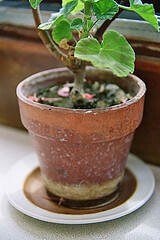
(photo courtesy of flickr user cath9)
The Geranium
by Theodore Roethke
When I put her out, once, by the garbage pail,
She looked so limp and bedraggled,
So foolish and trusting, like a sick poodle,
Or a wizened aster in late September,
I brought her back in again
For a new routine--
Vitamins, water, and whatever
Sustenance seemed sensible
At the time: she'd lived
So long on gin, bobbie pins, half-smoked cigars, dead beer,
Her shriveled petals falling
On the faded carpet, the stale
Steak grease stuck to her fuzzy leaves.
(Dried-out, she creaked like a tulip.)
The things she endured!--
The dumb dames shrieking half the night
Or the two of us, alone, both seedy,
Me breathing booze at her,
She leaning out of her pot toward the window.
Near the end, she seemed almost to hear me--
And that was scary--
So when that snuffling cretin of a maid
Threw her, pot and all, into the trash-can,
I said nothing.
But I sacked the presumptuous hag the next week,
I was that lonely.
The Waking
by Theodore Roethke
I wake to sleep, and take my waking slow.
I feel my fate in what I cannot fear.
I learn by going where I have to go.
We think by feeling. What is there to know?
I hear my being dance from ear to ear.
I wake to sleep, and take my waking slow.
Of those so close beside me, which are you?
God bless the Ground! I shall walk softly there,
And learn by going where I have to go.
Light takes the Tree; but who can tell us how?
The lowly worm climbs up a winding stair;
I wake to sleep, and take my waking slow.
Great Nature has another thing to do
To you and me, so take the lively air,
And, lovely, learn by going where to go.
This shaking keeps me steady. I should know.
What falls away is always. And is near.
I wake to sleep, and take my waking slow.
I learn by going where I have to go.

(photo courtesy of flickr user cath9)
The Geranium
by Theodore Roethke
When I put her out, once, by the garbage pail,
She looked so limp and bedraggled,
So foolish and trusting, like a sick poodle,
Or a wizened aster in late September,
I brought her back in again
For a new routine--
Vitamins, water, and whatever
Sustenance seemed sensible
At the time: she'd lived
So long on gin, bobbie pins, half-smoked cigars, dead beer,
Her shriveled petals falling
On the faded carpet, the stale
Steak grease stuck to her fuzzy leaves.
(Dried-out, she creaked like a tulip.)
The things she endured!--
The dumb dames shrieking half the night
Or the two of us, alone, both seedy,
Me breathing booze at her,
She leaning out of her pot toward the window.
Near the end, she seemed almost to hear me--
And that was scary--
So when that snuffling cretin of a maid
Threw her, pot and all, into the trash-can,
I said nothing.
But I sacked the presumptuous hag the next week,
I was that lonely.
The Waking
by Theodore Roethke
I wake to sleep, and take my waking slow.
I feel my fate in what I cannot fear.
I learn by going where I have to go.
We think by feeling. What is there to know?
I hear my being dance from ear to ear.
I wake to sleep, and take my waking slow.
Of those so close beside me, which are you?
God bless the Ground! I shall walk softly there,
And learn by going where I have to go.
Light takes the Tree; but who can tell us how?
The lowly worm climbs up a winding stair;
I wake to sleep, and take my waking slow.
Great Nature has another thing to do
To you and me, so take the lively air,
And, lovely, learn by going where to go.
This shaking keeps me steady. I should know.
What falls away is always. And is near.
I wake to sleep, and take my waking slow.
I learn by going where I have to go.
Saturday, January 6
When A Woman Loves A Man
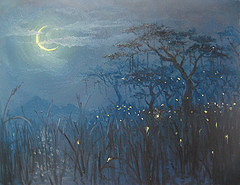
(photo courtesy of flickr user "Chosetec")
An excerpt from a poem for someone who I have never met but who I know got married today to her best friend.
Excerpt from:
When A Woman Loves A Man
by David Lehman
When a woman loves a man, she wants him to meet her at the
airport in a foreign country with a jeep.
When a man loves a woman he's there. He doesn't complain that
she's two hours late
and there's nothing in the refrigerator.
When a woman loves a man, she wants to stay awake.
She's like a child crying
at nightfall because she didn't want the day to end.
When a man loves a woman, he watches her sleep, thinking:
as midnight to the moon is sleep to the beloved.
A thousand fireflies wink at him.
The frogs sound like the string section
of the orchestra warming up.
The stars dangle down like earrings the shape of grapes.
Friday, January 5
Ignorant Before the Heavens Of My Life
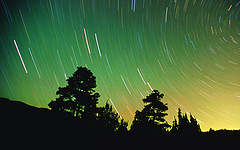
(photo courtesy of flickr user "Fort Photo")
Ignorant Before the Heavens Of My Life
by Rainer Maria Rilke
Ignorant before the heavens of my life,
I stand and gaze in wonder. Oh the vastness
of the stars. Their rising and descent. How still.
As if I didn't exist. Do I have any
share in this? Have I somehow dispensed with
their pure effect? Does my blood's ebb and flow
change with their changes? Let me put aside
every desire, every relationship
except this one, so that my heart grows used to
its farthest spaces. Better that it live
fully aware, in the terror of its stars, than
as if protected, soothed by what is near.
Friday, December 15
Veni Veni

And none too soon.
Veni Veni
Veni, veni, Emmanuel;
captivum solve Israel,
qui gemit in exilio,
privatus Dei Filio.
O come, O come, Emmanuel;
and ransom captive Israel,
that mourns in lonely exile here
until the Son of God appear.
Gaude! Gaude!
Emmanuel nascetur pro te, Israel.
Rejoice! Rejoice!
Emmanuel shall come to thee, O Israel.
Veni, veni, O Oriens;
solare nos adveniens,
noctis depelle nebulas,
dirasque noctis tenebras.
O come, thou Day-star, come and cheer
our spirits by thine advent here;
disperse the gloomy clouds of night,
and death's dark shadows put to flight.
Veni, Clavis Davidica!
Regna reclude caelica;
fac iter tutum superum,
et claude vias inferum.
O come, thou Key of David, come,
and open wide our heavenly home;
make safe the way that leads to thee,
and close the path to misery.
Veni, veni, Adonai!
Qui populo in Sinai,
legem dedisti vertice,
in maiestate gloriae.
O come to lead us, Adonai,
who to the tribes on height of Sinai
in ancient times did'st give the Law,
in cloud, and majesty and awe.
Gaude! Gaude!
Emmanuel nascetur pro te, Israel.
Monday, November 27
Moods
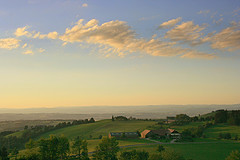
(photo courtesy of flickr user Tomsch)
Moods
by Sara Teasdale
I am the still rain falling,
Too tired for singing mirth --
Oh, be the green fields calling,
Oh, be for me the earth!
I am the brown bird pining
To leave the nest and fly --
Oh, be the fresh cloud shining,
Oh, be for me the sky!
Wednesday, November 15
They Say It Can't Be Done
I must admit that I directly and intentionally plagiarized one of the best poets I know in this piece, my dear friend Laura. Her Venn diagram image has stuck with me ever since I first read it in one of her poems.
An additional note on this poem: it is not personal. That is, I am talking about no specific person, although it was inspired by recent events. A good man I have never met died last night, and this poem partially expresses my grief that I will not (until heaven) get to learn from him or thank him for some of the greatest blessings ever to touch my life.

(courtesy, flickr user *~Uplifting Arts~*)
They Say It Can't Be Done
There is nothing to connect our souls.
Not a rope, not a strand, not one fiber
that by tugging both our hearts may be pulled.
Our circles do not Venn-like overlap.
My friends know nothing of your friends.
and your mother does not know mine.
Our cities were built centuries apart.
The Zodiac sets us directly opposite.
It snowed when you were born;
it rained over me.
We are wholly separate.
And yet my soul cannot help
but fit inside yours, convex to concave.
But there is nothing to meld us
until I remember the grand order of things.
There are two threads.
We can start here, and move from here.
Just two, and in the midst of them
I stake my justified love for you.
Two things:
You see the sun.
I see the sun.
You see the moon.
I see the moon.
(c.l.)
An additional note on this poem: it is not personal. That is, I am talking about no specific person, although it was inspired by recent events. A good man I have never met died last night, and this poem partially expresses my grief that I will not (until heaven) get to learn from him or thank him for some of the greatest blessings ever to touch my life.

(courtesy, flickr user *~Uplifting Arts~*)
They Say It Can't Be Done
There is nothing to connect our souls.
Not a rope, not a strand, not one fiber
that by tugging both our hearts may be pulled.
Our circles do not Venn-like overlap.
My friends know nothing of your friends.
and your mother does not know mine.
Our cities were built centuries apart.
The Zodiac sets us directly opposite.
It snowed when you were born;
it rained over me.
We are wholly separate.
And yet my soul cannot help
but fit inside yours, convex to concave.
But there is nothing to meld us
until I remember the grand order of things.
There are two threads.
We can start here, and move from here.
Just two, and in the midst of them
I stake my justified love for you.
Two things:
You see the sun.
I see the sun.
You see the moon.
I see the moon.
(c.l.)
Tuesday, November 14
Helpless

helpless
caught in a cube of music
nose pressed to the transparent
wall of a world of dissonance
ears fastened to the porous
surface to hear screams surrounding
fingers touched to tears smeared
over the glass in hopes the drops
will quench the outer dust
hands sliding down condensation
clasping at cracked and empty
palms on the other side
feet kicking the base frantic
to walk beside the soles pulling
chains across the desert
(c.l.)
Sunday, October 29
After Reading the 24th Chapter...
Fear has always been the demon on my shoulder, affecting even the way I view God and his wrath and judgment. I wrote this poem after thinking on these things.
After Reading the 24th Chapter of the Gospel of Matthew
Lord God,
promise us that the end of all days
will be like giving birth to a child.
That after the bloodshed,
labor pain racking, skin tearing,
mother and infant screaming,
the chaos of humans revolving,
we shall indeed not perish.
Promise us that in the end
you will wash us clean,
swath us in righteousness,
and lay us in the bend
of an omnipotent arm that
deals mercy more swiftly than justice;
that you will whisper quietness to us,
peace into our cramped souls,
breath into our new bodies,
and raise us in the light of your coming,
eyes blinking wide into fresh luminescence;
birth pains and groanings forgotten,
the judgment past, love evolving, and
everlasting life in our bones.
(c.l.)
After Reading the 24th Chapter of the Gospel of Matthew
Lord God,
promise us that the end of all days
will be like giving birth to a child.
That after the bloodshed,
labor pain racking, skin tearing,
mother and infant screaming,
the chaos of humans revolving,
we shall indeed not perish.
Promise us that in the end
you will wash us clean,
swath us in righteousness,
and lay us in the bend
of an omnipotent arm that
deals mercy more swiftly than justice;
that you will whisper quietness to us,
peace into our cramped souls,
breath into our new bodies,
and raise us in the light of your coming,
eyes blinking wide into fresh luminescence;
birth pains and groanings forgotten,
the judgment past, love evolving, and
everlasting life in our bones.
(c.l.)
Thursday, October 26
The Dance
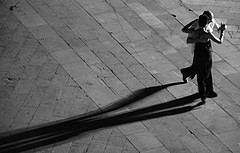
I wrote this for a dear friend.
The Dance
I love to dance with you.
That is, to talk with you.
Because every conversation with you
is a dance.
We both know the steps.
Your left to my right.
Your back to my forward.
We both know the missteps.
My foot on yours.
Your hand not in mine.
It is the knowing that is dear to me.
Most people must first learn the dance;
how to turn tongues and minds together
as well as arms, how to move in unison,
move forward,
move back.
We know the dance.
We are paired well.
I know your hesitations.
You know my abstractions.
Move forward,
move back.
Saturday, October 7
Tuesday, October 3
There Comes the Strangest Moment
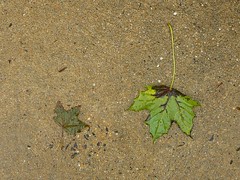
There Comes the Strangest Moment
by Kate Light
There comes the strangest moment in your life,
when everything you thought before breaks free--
what you relied upon, as ground-rule and as rite
looks upside down from how it used to be.
Skin's gone pale, your brain is shedding cells;
you question every tenet you set down;
obedient thoughts have turned to infidels
and every verb desires to be a noun.
I want--my want. I love--my love. I'll stay
with you. I thought transitions were the best,
but I want what's here to never go away.
I'll make my peace, my bed, and kiss this breast…
Your heart's in retrograde. You simply have no choice.
Things people told you turn out to be true.
You have to hold that body, hear that voice.
You'd have sworn no one knew you more than you.
How many people thought you'd never change?
But here you have. It's beautiful. It's strange.
Tuesday, September 19
When one has lived a long time alone
by Galway Kinnell
When one has lived a long time alone,
and the hermit thrush calls and there is an answer,
and the bullfrog head half out of water utters
the cantillations he sang in his first spring,
and the snake lowers himself over the threshold
and creeps away among the stones, one sees
they all live to mate with their kind, and one knows,
after a long time of solitude, after the many steps taken
away from one's kind, toward these other kingdoms,
the hard prayer inside one's own singing
is to come back, if one can, to one's own,
a world almost lost, in the exile that deepens,
when one has lived a long time alone.
When one has lived a long time alone,
and the hermit thrush calls and there is an answer,
and the bullfrog head half out of water utters
the cantillations he sang in his first spring,
and the snake lowers himself over the threshold
and creeps away among the stones, one sees
they all live to mate with their kind, and one knows,
after a long time of solitude, after the many steps taken
away from one's kind, toward these other kingdoms,
the hard prayer inside one's own singing
is to come back, if one can, to one's own,
a world almost lost, in the exile that deepens,
when one has lived a long time alone.
Friday, September 15
Autumn Day
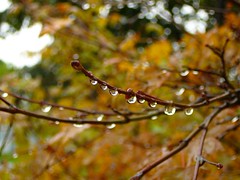
(Japanese Maple, taken today)
Autumn Day
by Rainer Maria Rilke
Lord: it is time. The summer was immense.
Lay your shadow on the sundials
and let loose the wind in the fields.
Bid the last fruits to be full;
give them another two more southerly days,
press them to ripeness, and chase
the last sweetness into the heavy wine.
Whoever has no house now will not build one anymore.
Whoever is alone now will remain so for a long time,
will stay up, read, write long letters,
and wander the avenunes, up and down,
restlessly, while the leaves are blowing.
Thursday, September 7
Half Acre
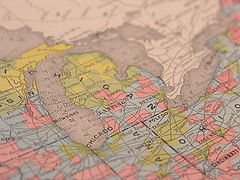
(photo courtesy of simonk on flickr)
A song this time. It has enchanted me.
Half Acre
by Hem, from Rabbit Songs
I am holding half an acre
Torn from the map of Michigan
And folded in this scrap of paper
Is the land I grew in
Think of every town you've lived in
Every room you lay your head
And what is it that you remember?
Do you carry every sadness with you?
Every hour your heart was broken
Every night the fear and darkness
Lay down with you?
A man is walking on the highway
A woman stares out at the sea
And light is only now just breaking
So we carry every sadness with us
Every hour our hearts were broken
Every night the fear and darkness
Lay down with us
But I am holding half an acre
Torn from the map of Michigan
I am carrying this scrap of paper
That can crack the darkest sky wide open
Every burden taken from me
Every night my heart unfolding
My home
Thursday, August 31
The Poet
The Poet
by Tom Wayman
Loses his position on worksheet or page in textbook
May speak much but makes little sense
Cannot give clear verbal instructions
Does not understand what he reads
Does not understand what he hears
Cannot handle “yes-no” questions
Has great difficulty interpreting proverbs
Has difficulty recalling what he ate for breakfast, etc.
Cannot tell a story from a picture
Cannot recognize visual absurdities
Has difficulty classifying and categorizing objects
Has difficulty retaining such things as
addition and subtraction facts, or multiplication tables
May recognize a word one day and not the next
by Tom Wayman
Loses his position on worksheet or page in textbook
May speak much but makes little sense
Cannot give clear verbal instructions
Does not understand what he reads
Does not understand what he hears
Cannot handle “yes-no” questions
Has great difficulty interpreting proverbs
Has difficulty recalling what he ate for breakfast, etc.
Cannot tell a story from a picture
Cannot recognize visual absurdities
Has difficulty classifying and categorizing objects
Has difficulty retaining such things as
addition and subtraction facts, or multiplication tables
May recognize a word one day and not the next
Wednesday, August 23
After Reading Tu Fu...
And then I found my summer poem.
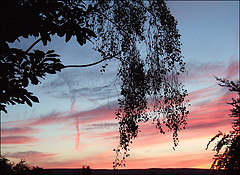
(photo courtesy of evissa on flickr)
After Reading Tu Fu, I Go Outside to the Dwarf Orchard
by Charles Wright

(photo courtesy of evissa on flickr)
After Reading Tu Fu, I Go Outside to the Dwarf Orchard
by Charles Wright
East of me, west of me, full summer.
How deeper than elsewhere the dusk is in your own yard.
Birds fly back and forth across the lawn
looking for home
As night drifts up like a little boat.
Day after day, I become of less use to myself.
Like this mockingbird,
I flit from one thing to the next.
What do I have to look forward to at fifty-four?
Tomorrow is dark.
Day-after-tomorrow is darker still.
The sky dogs are whimpering.
Fireflies are dragging the hush of evening
up from the damp grass.
Into the world's tumult, into the chaos of every day,
Go quietly, quietly.
Coffee & Dolls
A poem I found while searching for the keyword "summer" on The Academy of American Poets website.
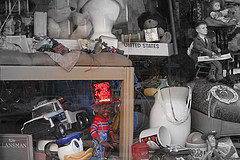
(photo courtesy of SeenyaRita on Flickr)
Coffee & Dolls
by April Bernard
It was a storefront for a small-time numbers runner,
pretending to be some sort of grocery. Coffeemakers
and Bustello cans populated the shelves, sparsely.
Who was fooled. The boxes bleached in the sun,
the old guys sat inside on summer lawn chairs,
watching tv. The applause from the talk shows and game shows
washed out the propped-open door like distant rain.
It closed for a few months. The slick sedan disappeared.
One spring day, it reopened, and this time a sign
decorated the window: COFFEE & DOLLS.
Yarn-haired, gingham-dressed floppy dolls
lolled among the coffee cans. A mastiff puppy,
the size and shape of a tipped-over fire hydrant,
guarded as the sedan and the old guys returned.
I don't know about you, but I've been looking
for a narrative in which suffering makes sense.
I mean, the high wail of the woman holding her dead child,
the wail that filled the street. I mean the sudden
fatal blooms on golden skin. I mean the crack deaths,
I mean the ice-cream truck that cruised the alphabets
and sold crack to the same deedle-dee-dee tune as fudgsicles.
I mean the raw scabs of the beaten mastiff, and many other
things.

(photo courtesy of SeenyaRita on Flickr)
Coffee & Dolls
by April Bernard
It was a storefront for a small-time numbers runner,
pretending to be some sort of grocery. Coffeemakers
and Bustello cans populated the shelves, sparsely.
Who was fooled. The boxes bleached in the sun,
the old guys sat inside on summer lawn chairs,
watching tv. The applause from the talk shows and game shows
washed out the propped-open door like distant rain.
It closed for a few months. The slick sedan disappeared.
One spring day, it reopened, and this time a sign
decorated the window: COFFEE & DOLLS.
Yarn-haired, gingham-dressed floppy dolls
lolled among the coffee cans. A mastiff puppy,
the size and shape of a tipped-over fire hydrant,
guarded as the sedan and the old guys returned.
I don't know about you, but I've been looking
for a narrative in which suffering makes sense.
I mean, the high wail of the woman holding her dead child,
the wail that filled the street. I mean the sudden
fatal blooms on golden skin. I mean the crack deaths,
I mean the ice-cream truck that cruised the alphabets
and sold crack to the same deedle-dee-dee tune as fudgsicles.
I mean the raw scabs of the beaten mastiff, and many other
things.
Sunday, August 13
Waking Up In The Greenhouse

Waking Up In The Greenhouse
Everyone should know what it is
to be ushered into morning
by warm sun and cool water,
clear sky and the jades and the olives
of this house of green and silver.
The birds wide awake with beating wings.
The farmers shoveling sweet feed to the cows.
The brightest flowers born in the gentle sun.
The softest sky and the fairy breeze.
All of these things ease me into wakefulness,
teaching me to take life at its own rhythm,
as slow-coming and certain-eyed as the dawn.
(c.l.)
Saturday, July 29
Logos
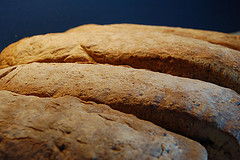
Logos
by Mary Oliver
Why wonder about the loaves and the fishes?
If you say the right words, the wine expands.
If you say them with love
and the felt ferocity of that love
and the felt necessity of that love,
the fish explode into many.
Imagine him, speaking,
and don't worry about what is reality,
or what is plain, or what is mysterious.
If you were there, it was all those things.
If you can imagine it, it is all those things.
Eat, drink, be happy.
Accept the miracle.
Accept, too, each spoken word
spoken with love.
Thursday, July 13
Winds
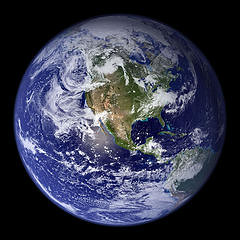
Winds
We do not understand
the high winds on hot days.
They froth the tops of the trees into waves,
letting us drown on the stifling ocean floor,
and we glare up in righteous indignation.
The wind is conversing with the maples
and we cannot hear what they are saying.
We understand the low winds.
They were sent from heaven for our comfort.
They clothe our skin in coolness,
and we sway into them as we do
into fur coats in snowfalls.
How pleasant the weather is today, we say,
how kind of the winds to descend to us.
We understand nothing.
We do not know that the winds pay us no heed.
The high winds laugh with the forest
at the joy of the sky;
they rage at something terrible
that happened across the sea.
And when we stand in the low winds,
assuming they blow to please us,
we have no idea that we are ignorant flies
in the presence of two lovers.
For the low wind bows to greet the earth,
reminding her in the wake
of his mighty jet streams and trade winds
that he knows gentleness.
That as she spins her sphere
of jade and azure through the crystaled heavens,
he knows her dust and pebbles
as well as her seas and sky.
(c.l.)
Monday, June 26
The Cities Inside Us

The Cities Inside Us
by Alberto Rios
We live in secret cities
And we travel unmapped roads.
We speak words between us that we recognize
But which cannot be looked up.
They are our words.
They come from very far inside our mouths.
You and I, we are the secret citizens of the city
Inside us, and inside us
There go all the cars we have driven
And seen, there are all the people
We know and have known, there
Are all the places that are
But which used to be as well. This is where
They went. They did not disappear.
We each take a piece
Through the eye and through the ear.
It's loud inside us, in there, and when we speak
In the outside world
We have to hope that some of that sound
Does not come out, that an arm
Not reach out
In place of the tongue.
Saturday, June 24
How do I love thee?
by Elizabeth Barrett Browning
I don't even care if it's cliched. It is the best there is.

How do I love thee? Let me count the ways.
I love thee to the depth and breadth and height
My soul can reach, when feeling out of sight
For the ends of being and ideal grace.
I love thee to the level of every day's
Most quiet need, by sun and candle-light.
I love thee freely, as men strive for right.
I love thee purely, as they turn from praise.
I love thee with the passion put to use
In my old griefs, and with my childhood's faith.
I love thee with a love I seemed to lose
With my lost saints. I love thee with the breath,
Smiles, tears, of all my life; and, if God choose,
I shall but love thee better after death.
I don't even care if it's cliched. It is the best there is.

How do I love thee? Let me count the ways.
I love thee to the depth and breadth and height
My soul can reach, when feeling out of sight
For the ends of being and ideal grace.
I love thee to the level of every day's
Most quiet need, by sun and candle-light.
I love thee freely, as men strive for right.
I love thee purely, as they turn from praise.
I love thee with the passion put to use
In my old griefs, and with my childhood's faith.
I love thee with a love I seemed to lose
With my lost saints. I love thee with the breath,
Smiles, tears, of all my life; and, if God choose,
I shall but love thee better after death.
Monday, June 12
After Years
I love this poem. It has inspired a couple of my own. I still need to buy Kooser's prize-winning book Delights and Shadows. I believe he was the U.S. poet laureate before Billy Collins.
After Years
by Ted Kooser
Today, from a distance, I saw you
walking away, and without a sound
the glittering face of a glacier
slid into the sea. An ancient oak
fell in the Cumberlands, holding only
a handful of leaves, and an old woman
scattering corn to her chickens looked up
for an instant. At the other side
of the galaxy, a star thirty-five times
the size of our own sun exploded
and vanished, leaving a small green spot
on the astronomer's retina
as he stood on the great open dome
of my heart with no one to tell.
After Years
by Ted Kooser
Today, from a distance, I saw you
walking away, and without a sound
the glittering face of a glacier
slid into the sea. An ancient oak
fell in the Cumberlands, holding only
a handful of leaves, and an old woman
scattering corn to her chickens looked up
for an instant. At the other side
of the galaxy, a star thirty-five times
the size of our own sun exploded
and vanished, leaving a small green spot
on the astronomer's retina
as he stood on the great open dome
of my heart with no one to tell.
Tuesday, May 30
Viriditas

on our morning commute
the newborn summer air rises
from honeysuckled thickets
and the roots of trees.
it mingles with the more
domesticated scents,
garden irises and dryer steam,
freshly hung laundry
from those who still believe
in the goodness of the outdoors.
driving, i cannot help
but thank God that this
is no passing glance at his creation:
for i am going to work in it,
to put flowers in earth
and sell them to openhanded gardeners.
i go to bury my hands in the soil,
to do nothing but give life a chance,
and by so doing preserve
this morning's holy pilgrimage
for the children, who will
play in creeks and snap twigs,
only later realizing that
they tread a hallowed temple,
one that resounds
with the rhythm of redemption.
(c.l.)
*viriditas: (latin) greenness, freshness, bloom
Thursday, May 25
Running to Stand Still
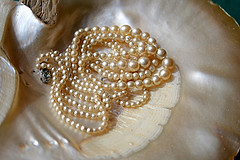
I want to marry someone who loves this song.
Running to Stand Still
by U2
and so she woke up
woke up from where she was lying still
said i gotta do something
about where we're going
step on a steam train
step out of the driving rain maybe
run from the darkness in the night
singing ah la la la de day
ah la la la de day
ah la la de day
sweet the sin
bitter the taste in my mouth
i see seven towers
but i only see one way out
you've got to cry without weeping
talk without speaking
scream without raising your voice
you know i took the poison
from the poison stream
then i floated out of here
singing ah la la la de day
ah la la la de day
ah la la de day
she runs through the streets
with her eyes painted red
under black belly of cloud in the rain
in through a doorway she brings me
white gold and pearls stolen from the sea
she is raging
she is raging
and the storm blows up in her eyes
she will
suffer the needle chill
she's running to stand
still
Monday, May 22
One Day a Woman
by Miller Williams
One day a woman picking peaches in Georgia
lost her hold on the earth and began to rise.
She grabbed limbs but leaves stripped off in her hands.
Some children saw her before she disappeared
into the white cloud, her limbs thrashing.
The children were disbelieved. The disappearance
was filed away with those of other women
who fell into bad hands and were soon forgotten.
Six months later a half-naked man in Kansas
working on the roof of the Methodist Church
was seen by half a dozen well-known
and highly respected citizens to move
directly upward, his tarbrush waving,
until he shrank away to a point and vanished.
Nobody who knew about the first event
knew of the second, so no connection was made.
The tarbrush fell to earth somewhere in Missouri
unnoticed among a herd of Guernsey cows.
One day a woman picking peaches in Georgia
lost her hold on the earth and began to rise.
She grabbed limbs but leaves stripped off in her hands.
Some children saw her before she disappeared
into the white cloud, her limbs thrashing.
The children were disbelieved. The disappearance
was filed away with those of other women
who fell into bad hands and were soon forgotten.
Six months later a half-naked man in Kansas
working on the roof of the Methodist Church
was seen by half a dozen well-known
and highly respected citizens to move
directly upward, his tarbrush waving,
until he shrank away to a point and vanished.
Nobody who knew about the first event
knew of the second, so no connection was made.
The tarbrush fell to earth somewhere in Missouri
unnoticed among a herd of Guernsey cows.
Saturday, May 13
A Line-Storm Song
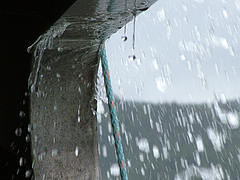
It stormed today while I was at work. The gales blew in the plastic walls of the greenhouse and at times we had to yell over the roar of the rain on the thin tin roofs. I heard rumors of five inches of rain in one hour in some regions, and half inches of hail. I glory in those times when it seems as if nature is feeling something, when it is unleashing its anger, or trying to calm the earth down, or radiating ecstasy.
Dedicated to my friends, who I miss, and who I fear do not miss me.
Come over the hills and far with me...
A Line-Storm Song
by Robert Frost
The line-storm clouds fly tattered and swift.
The road is forlorn all day,
Where a myriad snowy quartz stones lift,
And the hoof-prints vanish away.
The roadside flowers, too wet for the bee,
Expend their bloom in vain.
Come over the hills and far with me,
And be my love in the rain.
The birds have less to say for themselves
In the wood-world's torn despair
Than now these numberless years the elves,
Although they are no less there:
All song of the woods is crushed like some
Wild, earily shattered rose.
Come, be my love in the wet woods, come,
Where the boughs rain when it blows.
There is the gale to urge behind
And bruit our singing down,
And the shallow waters aflutter with wind
From which to gather your gown.
What matter if we go clear to the west,
And come not through dry-shod?
For wilding brooch shall wet your breast
The rain-fresh goldenrod.
Oh, never this whelming east wind swells
But it seems like the sea's return
To the ancient lands where it left the shells
Before the age of the fern;
And it seems like the time when after doubt
Our love came back amain.
Oh, come forth into the storm and rout
And be my love in the rain.
Tuesday, May 9
The Waking

I have my B.A. in English. I have the whole world in front of me and large pieces of my heart missing, scattered all over the nation and world. I don't know when or if they will come back to me.
I know only this:
The Waking
by Theodore Roethke
I wake to sleep, and take my waking slow.
I feel my fate in what I cannot fear.
I learn by going where I have to go.
We think by feeling. What is there to know?
I hear my being dance from ear to ear.
I wake to sleep, and take my waking slow.
Of those so close beside me, which are you?
God bless the Ground! I shall walk softly there,
And learn by going where I have to go.
Light takes the Tree; but who can tell us how?
The lowly worm climbs up a winding stair;
I wake to sleep, and take my waking slow.
Great Nature has another thing to do
To you and me; so take the lively air,
And, lovely, learn by going where to go.
This shaking keeps me steady. I should know.
What falls away is always. And is near.
I wake to sleep, and take my waking slow.
I learn by going where I have to go.
Friday, May 5
Graduation (Leaving Love)
I know some people won't understand, but I've never voluntarily done something so difficult as this. I have to turn myself into a machine to get through; my flesh and bone are far too tender.
If today was not an endless highway
If tonight was not a crooked trail
If tomorrow wasn't such a long time
Then lonesome would mean nothing to me at all
Yes, and only if my own true love was waiting
If I could hear his heart softly pounding
Yes, and only if he was lying by me
Would I lie in my bed once again
I can't see my reflection in the waters
I can't speak the sounds that show no pain
I can't hear the echo of my footsteps
Or remember the sound of my own name
Yes, and only if my own true love was waiting
If I could hear his heart softly pounding
Yes, and only if he was lying by me
Would I lie in my bed once again
There's beauty in that silver singing river
There's beauty in that sunrise in the sky
But none of these and nothing else can touch the beauty
That I remember in my true love's eyes
Yes, and only if my own true love was waiting
If I could hear his heart softly pounding
Yes, and only if he was lying by me
Would I lie in my bed once again
(nickel creek)
If today was not an endless highway
If tonight was not a crooked trail
If tomorrow wasn't such a long time
Then lonesome would mean nothing to me at all
Yes, and only if my own true love was waiting
If I could hear his heart softly pounding
Yes, and only if he was lying by me
Would I lie in my bed once again
I can't see my reflection in the waters
I can't speak the sounds that show no pain
I can't hear the echo of my footsteps
Or remember the sound of my own name
Yes, and only if my own true love was waiting
If I could hear his heart softly pounding
Yes, and only if he was lying by me
Would I lie in my bed once again
There's beauty in that silver singing river
There's beauty in that sunrise in the sky
But none of these and nothing else can touch the beauty
That I remember in my true love's eyes
Yes, and only if my own true love was waiting
If I could hear his heart softly pounding
Yes, and only if he was lying by me
Would I lie in my bed once again
(nickel creek)
Wednesday, May 3
I've Been Known
by Denise Duhamel
to spread it on thick to shoot off my mouth to get it off my chest
to tell him where
to get off
to stay put to face the music to cut a shine to go under to sell
myself short to play
myself down
to paint the town to fork over to shell out to shoot up to pull a
fast one to go haywire
to take a shine to
to be stuck on to glam it up to vamp it up to get her one better to
eat a little higher
on the hog
to win out to get away with to go to the spot to make a stake to
make a stand to
stand for something to stand up for
to snow under to slip up to go for it to take a stab at it to try out
to go places to play
up to get back at
to size up to stand off to slop over to be solid with to lose my
shirt to get myself off
to get myself off the hook
Friday, April 28
The Week Before College Graduation

She’s right—
it’s not apathy that flattens my brain
like one of her Frisbees
as it wings through each day,
rebounding from someone else’s hand,
flying on someone else’s throw.
It’s not apathy that has curdled
my craving for sweet knowledge
so that my stomach lurches when I sit down
to parse a Spanish verb,
to examine the starched silt of Victorian England
and write one more paper
to add to the ream I’ve written
in exchange for just one, in calligraphy.
This thing that has stolen sleep from me,
that pins open my eyes to stare at nothing,
that freezes my purpose, my motivation
into a blunt cube of mute apprehension—
no, it’s not apathy.
It’s impossible to not care. No.
Someone has their fingers tangled in my hair,
pulling back my head to stare at the stars.
Something has planted my feet in the mud
and held out my arms to catch all the rain.
Some force of being, some impulse for justice
has interrupted my continuum as it did for Joshua,
has stopped my sun over Gibeon, and is screaming,
“Too many times have your epochs gone unnoticed.
Too many times has your life undergone metamorphosis
in a slow and single moment that you
were traveling too fast to see.
No more will you be carefree,
no more will you skip around your life’s transformation.
Stand, lift up your head,
and watch your being supernova into newness.
Stand, look down at your earth
and watch the quake strip your life of what has been.
Stand. This time, you will watch your butterfly struggle
from faded cocoon to fresh quickening.
The old has gone, the new is coming.
4.27.06
crystal l.
Monday, April 17
Tell all the Truth but tell it slant
Tell all the Truth but tell it slant
by Emily Dickinson
Tell all the Truth but tell it slant—
Success in Circuit lies
Too bright for our infirm Delight
The Truth’s superb surprise
As Lightning to the Children eased
With explanation kind
The Truth must dazzle gradually
Or every man be blind—
by Emily Dickinson
Tell all the Truth but tell it slant—
Success in Circuit lies
Too bright for our infirm Delight
The Truth’s superb surprise
As Lightning to the Children eased
With explanation kind
The Truth must dazzle gradually
Or every man be blind—
Tuesday, April 11
Selecting a Reader
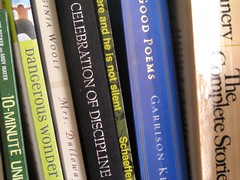
Selecting a Reader
by Ted Kooser
First, I would have her be beautiful,
and walking carefully up on my poetry
at the loneliest moment of an afternoon,
her hair still damp at the neck
from washing it. She should be wearing
a raincoat, an old one, dirty
from not having money enough for the cleaners.
She will take out her glasses, and there
in the bookstore, she will thumb
over my poems, then put the book back
up on its shelf. She will say to herself,
"For that kind of money, I can get
my raincoat cleaned." And she will.
Saturday, April 8
Famous
A friend just brought to my attention the fact that I've been "published" on the Academy of American Poets web site. Well okay, not really. It's just a response to a project they're doing for National Poetry Month, in which people send in lines of poems that are very dear to them and explain why. Click here and look under April 8 to see my entry. This is the poem my lines come from:
Famous
by Naomi Nye
The river is famous to the fish.
The loud voice is famous to silence,
which knew it would inherit the earth
before anybody said so.
The cat sleeping on the fence is famous to the birds
watching him from the birdhouse.
The tear is famous, briefly, to the cheek.
The idea you carry close your bosom
is famous to your bosom.
The boot is famous to the earth,
more famous than the dress shoe,
which is famous only to floors.
The bent photograph is famous to the one who carries it
and is not at all famous to the one who is pictured.
I want to be famous to shuffling men
who smile while crossing streets,
sticky children in grocery lines,
famous as the one who smiled back.
I want to be famous in the way a pulley is famous,
or a buttonhole, not because it did anything spectacular,
but because it never forgot what it could do.
Famous
by Naomi Nye
The river is famous to the fish.
The loud voice is famous to silence,
which knew it would inherit the earth
before anybody said so.
The cat sleeping on the fence is famous to the birds
watching him from the birdhouse.
The tear is famous, briefly, to the cheek.
The idea you carry close your bosom
is famous to your bosom.
The boot is famous to the earth,
more famous than the dress shoe,
which is famous only to floors.
The bent photograph is famous to the one who carries it
and is not at all famous to the one who is pictured.
I want to be famous to shuffling men
who smile while crossing streets,
sticky children in grocery lines,
famous as the one who smiled back.
I want to be famous in the way a pulley is famous,
or a buttonhole, not because it did anything spectacular,
but because it never forgot what it could do.
Friday, April 7
One Art
My life is plummeting into the abyss of the past faster than I can shake a stick at. I thought I had just posted on this thing, and nay, I find out that it has been four whole days.
Right after Easter, I have my final project in English Senior Seminar due, and I'd like to expand on my theory that this is one of, if not the best time to write and appreciate poetry. I don't know if I can pull it off, but I'll certainly have fun trying, which is what counts when I'm finishing up 19 credit hours, a part-time job, and relationships with dear, dear people I won't see again for a long time.
I think we've come to a great place in poetry--we appreciate multiplicity in form and genre, we've brought about the happy marriage of realism and romanticism, and we rely just enough on sound and rhythm to create lovely poetry, but not so much that we lose readability in the attempt to design a perfect metric scheme. Granted, some of this newer, extremely experimental stuff, as well as the voyeuristic, sexual-politics-ridden refuse I could leave behind without qualm, but fortunately, that kind of poetry seems to be in the minority.
I just convinced our school library to purchase a wealth of new poetry anthologies and collections. Anything to make that sad, but cozy little building more relevant.
One Art
by Elizabeth Bishop
The art of losing isn't hard to master;
so many things seem filled with the intent
to be lost that their loss is no disaster.
Lose something every day. Accept the fluster
of lost door keys, the hour badly spent.
The art of losing isn't hard to master.
Then practice losing farther, losing faster:
places, and names, and where it was you meant
to travel. None of these will bring disaster.
I lost my mother's watch. And look! my last, or
next-to-last, of three loved houses went.
The art of losing isn't hard to master.
I lost two cities, lovely ones. And, vaster,
some realms I owned, two rivers, a continent.
I miss them, but it wasn't a disaster.
--Even losing you (the joking voice, a gesture
I love) I shan't have lied. It's evident
the art of losing's not too hard to master
though it may look like (Write it!) like disaster.
Right after Easter, I have my final project in English Senior Seminar due, and I'd like to expand on my theory that this is one of, if not the best time to write and appreciate poetry. I don't know if I can pull it off, but I'll certainly have fun trying, which is what counts when I'm finishing up 19 credit hours, a part-time job, and relationships with dear, dear people I won't see again for a long time.
I think we've come to a great place in poetry--we appreciate multiplicity in form and genre, we've brought about the happy marriage of realism and romanticism, and we rely just enough on sound and rhythm to create lovely poetry, but not so much that we lose readability in the attempt to design a perfect metric scheme. Granted, some of this newer, extremely experimental stuff, as well as the voyeuristic, sexual-politics-ridden refuse I could leave behind without qualm, but fortunately, that kind of poetry seems to be in the minority.
I just convinced our school library to purchase a wealth of new poetry anthologies and collections. Anything to make that sad, but cozy little building more relevant.
One Art
by Elizabeth Bishop
The art of losing isn't hard to master;
so many things seem filled with the intent
to be lost that their loss is no disaster.
Lose something every day. Accept the fluster
of lost door keys, the hour badly spent.
The art of losing isn't hard to master.
Then practice losing farther, losing faster:
places, and names, and where it was you meant
to travel. None of these will bring disaster.
I lost my mother's watch. And look! my last, or
next-to-last, of three loved houses went.
The art of losing isn't hard to master.
I lost two cities, lovely ones. And, vaster,
some realms I owned, two rivers, a continent.
I miss them, but it wasn't a disaster.
--Even losing you (the joking voice, a gesture
I love) I shan't have lied. It's evident
the art of losing's not too hard to master
though it may look like (Write it!) like disaster.
Friday, March 31
Thursday Night
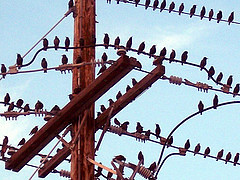
Thursday Night
Tell me who I am so I can be that person.
You've handed me the second fiddle--
just tell me what tune we're playing.
My sidekick suit fits;
I'd just rather not have to gasp
to keep up with you.
Tell me I am the ice in your glass
or the birds on your telephone pole.
I don't mind being unnecessary,
but it would be nice to be expected.
3.31.06
crystal l.
Tuesday, March 28
April is National Poetry Month!
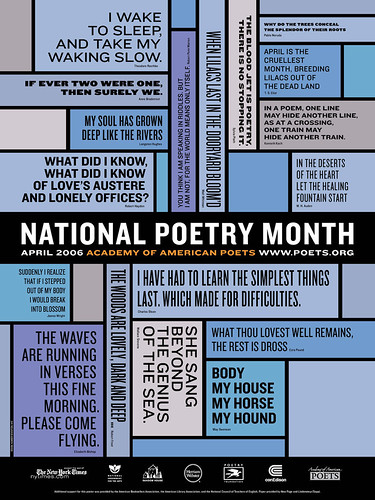
Spring is like a perhaps hand
by e.e. cummings
Spring is like a perhaps hand
(which comes carefully
out of Nowhere)arranging
a window,into which people look(while
people stare
arranging and changing placing
carefully there a strange
thing and a known thing here)and
changing everything carefully
spring is like a perhaps
Hand in a window
(carefully to
and fro moving New and
Old things,while
people stare carefully
moving a perhaps
fraction of flower here placing
an inch of air there)and
without breaking anything.
Friday, March 24
A Selection of African-American Poetry
The Negro Speaks of Riversby Langston Hughes
Sympathy
by Paul Laurence Dunbar
The Bean Eaters
by Gwendolyn Brooks
I've known rivers:
I've known rivers ancient as the world and older than the
flow of human blood in human veins.
My soul has grown deep like the rivers.
I bathed in the Euphrates when dawns were young.
I built my hut near the Congo and it lulled me to sleep.
I looked upon the Nile and raised the pyramids above it.
I heard the singing of the Mississippi when Abe Lincoln
went down to New Orleans, and I've seen its muddy
bosom turn all golden in the sunset.
I've known rivers:
Ancient, dusky rivers.
My soul has grown deep like the rivers.
Sympathy
by Paul Laurence Dunbar
I know what the caged bird feels, alas!
When the sun is bright on the upland slopes;
When the wind stirs soft through the springing grass,
And the river flows like a stream of glass;
When the first bird sings and the first bud opes,
And the faint perfume from its chalice steals--
I know what the caged bird feels!
I know why the caged bird beats its wing
Till its blood is red on the cruel bars;
For he must fly back to his perch and cling
When he fain would be on the bough a-swing;
And a pain still throbs in the old, old scars
And they pulse again with a keener sting--
I know why he beats his wing!
I know why the caged bird sings, ah me,
When his wing is bruised and his bosom sore,--
When he beats his bars and he would be free;
It is not a carol of joy or glee,
But a prayer that he sends from his heart's deep core,
But a plea, that upward to Heaven he flings--
I know why the caged bird sings!
The Bean Eaters
by Gwendolyn Brooks
They eat beans mostly, this old yellow pair.
Dinner is a casual affair.
Plain chipware on a plain and creaking wood,
Tin flatware.
Two who are Mostly Good.
Two who have lived their day,
But keep on putting on their clothes
And putting things away.
And remembering . . .
Remembering, with twinklings and twinges,
As they lean over the beans in their rented back room that
is full of beads and receipts and dolls and cloths,
tobacco crumbs, vases and fringes.
Sunday, March 19
Love Poem with Toast
Sometimes poems come at the perfect time.
Love Poem with Toast
by Miller Williams
Some of what we do, we do
to make things happen,
the alarm to wake us up, the coffee to perc,
the car to start.
The rest of what we do, we do
trying to keep something from doing something,
the skin from aging, the hoe from rusting,
the truth from getting out.
With yes and no like the poles of a battery
powering our passage through the days,
we move, as we call it, forward,
wanting to be wanted,
wanting not to lose the rain forest,
wanting the water to boil,
wanting not to have cancer,
wanting to be home by dark,
wanting not to run out of gas,
as each of us wants the other
watching at the end,
as both want not to leave the other alone,
as wanting to love beyond this meat and bone,
we gaze across breakfast and pretend.
Love Poem with Toast
by Miller Williams
Some of what we do, we do
to make things happen,
the alarm to wake us up, the coffee to perc,
the car to start.
The rest of what we do, we do
trying to keep something from doing something,
the skin from aging, the hoe from rusting,
the truth from getting out.
With yes and no like the poles of a battery
powering our passage through the days,
we move, as we call it, forward,
wanting to be wanted,
wanting not to lose the rain forest,
wanting the water to boil,
wanting not to have cancer,
wanting to be home by dark,
wanting not to run out of gas,
as each of us wants the other
watching at the end,
as both want not to leave the other alone,
as wanting to love beyond this meat and bone,
we gaze across breakfast and pretend.
Tuesday, February 28
Poetry
Poetry
by Don Paterson
In the same way that the mindless diamond keeps
one spark of the planet's early fires
trapped forever in its net of ice,
it's not love's later heat that poetry holds,
but the atom of the love that drew it forth
from the silence: so if the bright coal of his love
begins to smoulder, the poet hears his voice
suddenly forced, like a bar-room singer's -- boastful
with his own huge feeling, or drowned by violins;
but if it yields a steadier light, he knows
the pure verse, when it finally comes, will sound
like a mountain spring, anonymous and serene.
Beneath the blue oblivious sky, the water
sings of nothing, not your name, not mine.
by Don Paterson
In the same way that the mindless diamond keeps
one spark of the planet's early fires
trapped forever in its net of ice,
it's not love's later heat that poetry holds,
but the atom of the love that drew it forth
from the silence: so if the bright coal of his love
begins to smoulder, the poet hears his voice
suddenly forced, like a bar-room singer's -- boastful
with his own huge feeling, or drowned by violins;
but if it yields a steadier light, he knows
the pure verse, when it finally comes, will sound
like a mountain spring, anonymous and serene.
Beneath the blue oblivious sky, the water
sings of nothing, not your name, not mine.
Tuesday, February 21
Mad World
If you can find the Gary Jules version of this song, do. I believe it's on the Donnie Darko soundtrack.
Mad World
All around me are familiar faces
Worn out places, worn out faces
Bright and early for their daily races
Going nowhere, going nowhere
Their tears are filling up their glasses
No expression, no expression
Hide my head, I want to drown my sorrow
No tomorrow, no tomorrow
And I find it kinda funny
I find it kinda sad
The dreams in which I'm dying
Are the best I've ever had
I find it hard to tell you
I find it hard to take
When people run in circles
It's a very, very
Mad world, mad world
Children waiting for the day they feel good
Happy Birthday, Happy Birthday
Made to feel the way that every child should
Sit and listen, sit and listen
Went to school and I was very nervous
No one knew me, no one knew me
Hello teacher, tell me what's my lesson
Look right through me, look right through me
And I find it kinda funny
I find it kinda sad
The dreams in which I'm dying
Are the best I've ever had
I find it hard to tell you
I find it hard to take
When people run in circles
It's a very, very
Mad world, mad world
Enlarging your world
Mad world
Mad World
All around me are familiar faces
Worn out places, worn out faces
Bright and early for their daily races
Going nowhere, going nowhere
Their tears are filling up their glasses
No expression, no expression
Hide my head, I want to drown my sorrow
No tomorrow, no tomorrow
And I find it kinda funny
I find it kinda sad
The dreams in which I'm dying
Are the best I've ever had
I find it hard to tell you
I find it hard to take
When people run in circles
It's a very, very
Mad world, mad world
Children waiting for the day they feel good
Happy Birthday, Happy Birthday
Made to feel the way that every child should
Sit and listen, sit and listen
Went to school and I was very nervous
No one knew me, no one knew me
Hello teacher, tell me what's my lesson
Look right through me, look right through me
And I find it kinda funny
I find it kinda sad
The dreams in which I'm dying
Are the best I've ever had
I find it hard to tell you
I find it hard to take
When people run in circles
It's a very, very
Mad world, mad world
Enlarging your world
Mad world
Tuesday, February 14
Thursday, February 9
God Says Yes To Me
A poem that will never cease to throw me off or make me think.
God Says Yes To Me
by Kaylin Haught
I asked God if it was okay to be melodramatic
and she said yes
I asked her if it was okay to be short
and she said it sure is
I asked her if I could wear nail polish
or not wear nail polish
and she said honey
she calls me that sometimes
she said you can do just exactly
what you want to
Thanks God I said
And is it even okay if I don't paragraph
my letters
Sweetcakes God said
who knows where she picked that up
what I'm telling you is
Yes Yes Yes
(from Poetry 180, arranged by Billy Collins)
God Says Yes To Me
by Kaylin Haught
I asked God if it was okay to be melodramatic
and she said yes
I asked her if it was okay to be short
and she said it sure is
I asked her if I could wear nail polish
or not wear nail polish
and she said honey
she calls me that sometimes
she said you can do just exactly
what you want to
Thanks God I said
And is it even okay if I don't paragraph
my letters
Sweetcakes God said
who knows where she picked that up
what I'm telling you is
Yes Yes Yes
(from Poetry 180, arranged by Billy Collins)
Sunday, February 5
Post Secret
This week's batch of Post Secret entries are better than most. The concept still intrigues me, even though the site's gone a little down the tubes regarding cleanliness and propriety. When the secrets people post actually make sense, when they point to a common human condition--that's when I think they are most poignant. They are the things everyone thinks and no one says.


Wednesday, February 1
Moderation Is Not a Negation...
There are days I wish I could shout this poem at the majority of the world. But most of them wouldn't get it. (Editorial note: Thanks, Jason. I figured there was some html tag for formatting, but I was too lazy to look it up. Thanks for the assistance.)
Moderation Is Not a Negation of Intensity, But Helps Avoid Monotonyby John Tagliabue
Moderation Is Not a Negation of Intensity, But Helps Avoid Monotonyby John Tagliabue
Will you stop for a while, stop trying to pull yourself
together
for some clear "meaning"--some momentary summary?
no one
can have poetry or dances, prayers or climaxes all day;
the ordinary
blankness of little dramatic consciousness is good for the
health sometimes,
only Dostoevsky can be Dostoevskian at such long
long tumultuous stretches;
look what that intensity did to poor great Van Gogh!;
linger, lunge,
scrounge and be stupid, that doesn't take much centering
of one's forces;
as wise Whitman said "lounge and invite the soul." Get
enough sleep;
and not only because (as Cocteau said) "poetry is the
literature of sleep";
be a dumb bell for a few minutes at least; we don't want
Sunday church bells
ringing constantly.
Sunday, January 29
Invitation to the Voyage

Johannes Vermeer, Allegory of Painting (The Painter In His Studio), 1666
This afternoon I'm working on a brief analysis of the poetry of Charles Baudelaire, one of the most famous French poets, for my World Literature class. The only background I know of him is the two and a half page introduction to just a few of his poems in my anthology, but he and his art are intriguing nonetheless. They say Baudelaire wrote poetry to shock, and so it seems, because even in the 21st century it still does. In his poem "The Carcass," he observes to his female companion that for all her beauty, she will one day end up as the maggot-ridden, half-eaten animal they find on their afternoon stroll, and then she will be hard pressed to "explain to the worms / Who cherish your body so fine, / That I am the keeper for corpses of love / Of the form, and the essence divine!" Encouraging stuff.
I'll post something a bit more palatable of his here. "The Voyage," according to my Norton Anthology of World Masterpieces, is a description of "the opposite of inertia, an active search for goals always out of reach." The "Invitation" summons the reader to "an exotic land of peace, beauty, and sensuous harmony. The voyage is imaginary, of course, implying two forms of escape from reality: an escape out of real time into a primeval accord of the senses, and an escape into another artistic vision--the glowing interiors painted by such Dutch masters as Jan Vermeer."
Invitation to the Voyage
by Charles Baudelaire
translated by Richard Wilbur
My child, my sister, dream
How sweet all things would seem
Were we in that kind land to live together,
And there love slow and long,
There love and die among
Those scenes that image you, that sumptuous weather.
Drowned suns that glimmer there
Through cloud-disheveled air
Move me with such a mystery as appears
Within those other skies
Of your treacherous eyes
When I behold them shining through their tears.
There, there is nothing else but grace and measure,
Richness, quietness, and pleasure.
Furniture that wears
The lustre of the years
Softly would glow within our glowing chamber,
Flowers of rarest bloom
Proffering their perfume
Mixed with the vague fragrances of amber;
Gold ceilings would there be,
Mirrors deep as the sea,
The walls all in an Eastern splendor hung--
Nothing but should address
The soul's loneliness,
Speaking her sweet and secret native tongue.
There, there is nothing but grace and measure,
Richness, quietness, and pleasure.
See, sheltered from the swells
There in the still canals
Those drowsy ships that dream of sailing forth;
It is to satisfy
Your least desire, they ply
Hither through all the waters of the earth.
The sun at close of day
Clothes the fields of hay,
Then the canals, at last the town entire
In hyacinth and gold:
Slowly the land is rolled
Sleepward under a sea of gentle fire.
There, there is nothing but grace and measure,
Richness, quietness, and pleasure.
Thursday, January 26
Some Nights I Am Glad
some nights i am glad to be caught up
in this cosmic squall called life
i rest in thankfulness for my place
in this sickly sway of the heavens
for my heart that beats
with the rhythm of the falling stars
it means i am small
it means i matter
i am the dust speck
in this oyster of a universe
and it means that someday i will dwell
in the heart of the great luminous pearl
of redemption
1.25.06
crystal l.
in this cosmic squall called life
i rest in thankfulness for my place
in this sickly sway of the heavens
for my heart that beats
with the rhythm of the falling stars
it means i am small
it means i matter
i am the dust speck
in this oyster of a universe
and it means that someday i will dwell
in the heart of the great luminous pearl
of redemption
1.25.06
crystal l.
Saturday, January 21
The Abnormal Is Not Courage
I think it is people like my grandparents who have taught me the truth of this poem. They are not headstrong. They do not rush in when a hero is needed to save the day. They are gently saving it, bit by bit, behind the scenes: digging rocks out of the garden, loving their children, cooking a meal, carving and fitting fresh, clean wood.
Danger calls for urgency. Extraordinary circumstances need actions that are un-pondered; they call upon sheer survival instinct. It is courageous to block a speeding bullet for someone, or to march out in war, or to save a person from drowning, but I hold that courage is also steady and perpetual. It sometimes requires great thought and detail. The single mother who cooks dinner every night after work; the boy who musters the nerve to ask his teacher for help; the misunderstood artist who continues to create... these too demonstrate courage.
It is the kind of courage I want. This description fascinates me: Not strangeness, but a leap forward of the same quality. My courage does not consist of those things which I am not, but of the "crescendo" of those things I already am. My courage will not manifest itself in a marvelous act that is completely out of my character; it will be the fruition, "the culmination," of what good I am currently cultivating in my character: love, patience, wisdom, joy. If courage were the abnormal, we would think of it as a miracle visited on the lucky, on the brave, only occasionally. If courage can indeed be cultivated, it must grow out of something that is already in us.
I don't know about you, but that inspires me.
The Abnormal Is Not Courage
by Jack Gilbert
The Poles rode out from Warsaw against the German
Tanks on horses. Rode knowing, in sunlight, with sabers.
A magnitude of beauty that allows me no peace.
And yet this poem would lessen that day. Question
The bravery. Say it's not courage. Call it a passion.
Would say courage isn't that. Not at its best.
It was impossible, and with form. They rode in sunlight.
Were mangled. But I say courage is not the abnormal.
Not the marvelous act. Not Macbeth with fine speeches.
The worthless can manage in public, or for the moment.
It is too near the whore's heart: the bounty of impulse,
And the failure to sustain even small kindness.
Not the marvelous act, but the evident conclusion of being.
Not strangeness, but a leap forward of the same quality.
Accomplishment. The even loyalty. But fresh.
Not the Prodigal Son, nor Faustus. But Penelope.
The thing steady and clear. Then the crescendo.
The real form. The culmination. And the exceeding.
Not the surprise. The amazed understanding. The marriage,
Not the month's rapture. Not the exception. The beauty
That is of many days. Steady and clear.
It is the normal excellence, of long accomplishment.
(taken from "The Contemporary American Poets: American Poetry since 1940," edited by Mark Strand, Signet Classic, copyright 1969)
Danger calls for urgency. Extraordinary circumstances need actions that are un-pondered; they call upon sheer survival instinct. It is courageous to block a speeding bullet for someone, or to march out in war, or to save a person from drowning, but I hold that courage is also steady and perpetual. It sometimes requires great thought and detail. The single mother who cooks dinner every night after work; the boy who musters the nerve to ask his teacher for help; the misunderstood artist who continues to create... these too demonstrate courage.
It is the kind of courage I want. This description fascinates me: Not strangeness, but a leap forward of the same quality. My courage does not consist of those things which I am not, but of the "crescendo" of those things I already am. My courage will not manifest itself in a marvelous act that is completely out of my character; it will be the fruition, "the culmination," of what good I am currently cultivating in my character: love, patience, wisdom, joy. If courage were the abnormal, we would think of it as a miracle visited on the lucky, on the brave, only occasionally. If courage can indeed be cultivated, it must grow out of something that is already in us.
I don't know about you, but that inspires me.
The Abnormal Is Not Courage
by Jack Gilbert
The Poles rode out from Warsaw against the German
Tanks on horses. Rode knowing, in sunlight, with sabers.
A magnitude of beauty that allows me no peace.
And yet this poem would lessen that day. Question
The bravery. Say it's not courage. Call it a passion.
Would say courage isn't that. Not at its best.
It was impossible, and with form. They rode in sunlight.
Were mangled. But I say courage is not the abnormal.
Not the marvelous act. Not Macbeth with fine speeches.
The worthless can manage in public, or for the moment.
It is too near the whore's heart: the bounty of impulse,
And the failure to sustain even small kindness.
Not the marvelous act, but the evident conclusion of being.
Not strangeness, but a leap forward of the same quality.
Accomplishment. The even loyalty. But fresh.
Not the Prodigal Son, nor Faustus. But Penelope.
The thing steady and clear. Then the crescendo.
The real form. The culmination. And the exceeding.
Not the surprise. The amazed understanding. The marriage,
Not the month's rapture. Not the exception. The beauty
That is of many days. Steady and clear.
It is the normal excellence, of long accomplishment.
(taken from "The Contemporary American Poets: American Poetry since 1940," edited by Mark Strand, Signet Classic, copyright 1969)
Wednesday, January 18
Wunderkind

This song plays during the credits of The Lion, The Witch, and The Wardrobe and appears on the soundtrack. Specially written for the film, it functions both as Lucy's theme song and the anthem of someone new to the numinous, entranced with the beyond, with the place where fantasy meets supernatural reality.
I do love this song, but saying much more than that would cheapen it. Suffice it to say that I have my own wardrobe and my own Narnia, places I see shadows of in my head that I believe will one day be fully revealed. Now we see through a glass darkly... It is no shallowness, no frivolous child's fantasy to seek this "deeper wonderment." Perhaps it is for the poets and artists and composers to see more clearly, but I think everyone carries a bit of it in them. That is, if they haven't completely trampled the child, the wunderkind, that lives inside them. May our theological profundity always be tempered with a healthy wonder, a divine curiosity and vision. May Narnia's virgin snow always lie on the other side of the common wardrobe.
Wunderkind
by Alanis Morissette
Oh, perilous place walk backwards toward you
Blink disbelieving eyes chilled to the bone
Most visibly brave, no apprehended bloom
First to take this foot to virgin snow
I am magnet for all kinds of deeper wonderment
I am a wunderkind, ohh oh oh
And I live the envelope pushed far enough to believe this
I am a princess on the way to my throne
Destined to serve, destined to roam
Oh, ominous place spellbound and un-child-proofed
My least favorite shelter bear alone
Compatriots in face, they’d cringe if I told you
Our best back pocket secret, our bond full blown
And I am a magnet for all kinds of deeper wonderment
I am a wunderkind, ohh oh oh
And I am pioneer naïve enough to believe this
I am a princess on the way to my throne
Destined to seek, destined to know
Most beautiful place reborn and blown off roof
My view about-face whether great will be done
And I am a magnet for all kinds of deeper wonderment
I am a wunderkind, ohh oh oh
I am a groundbreaker naïve enough to believe this
I am a princess on the way to my throne
And I am a magnet for all kinds of deeper wonderment
I am a wunderkind, ohh oh oh
I am a Joan of Arc and smart enough to believe this
I am a princess on the way to my throne
Destined to reign, destined to roam
Destined to reign, destined to roam
Sunday, January 15
To be of use
Another selection from Good Poems. These speak for themselves.
To be of use
by Marge Piercy
The people I love the best
jump into work head first
without dallying in the shallows
and swim off with sure strokes almost out of sight.
They seem to become natives of that element,
the black sleek heads of seals
bouncing like half-submerged balls.
I love people who harness themselves, an ox to a heavy cart,
who pull like water buffalo, with massive patience,
who strain in the mud and the muck to move things forward,
who do what has to be done, again and again.
I want to be with people who submerge
in the task, who go into the fields to harvest
and work in a row and pass the bags along,
who are not parlor generals and field deserters
but move in a common rhythm
when the food must come in or the fire be put out.
The work of the world is common as mud.
Botched, it smears the hands, crumbles to dust.
But the thing worth doing well done
has a shape that satisfies, clean and evident.
Greek amphoras for wine or oil,
Hopi vases that held corn, are put in museums
but you know they were made to be used.
The pitcher cries for water to carry
and a person for work that is real.
To be of use
by Marge Piercy
The people I love the best
jump into work head first
without dallying in the shallows
and swim off with sure strokes almost out of sight.
They seem to become natives of that element,
the black sleek heads of seals
bouncing like half-submerged balls.
I love people who harness themselves, an ox to a heavy cart,
who pull like water buffalo, with massive patience,
who strain in the mud and the muck to move things forward,
who do what has to be done, again and again.
I want to be with people who submerge
in the task, who go into the fields to harvest
and work in a row and pass the bags along,
who are not parlor generals and field deserters
but move in a common rhythm
when the food must come in or the fire be put out.
The work of the world is common as mud.
Botched, it smears the hands, crumbles to dust.
But the thing worth doing well done
has a shape that satisfies, clean and evident.
Greek amphoras for wine or oil,
Hopi vases that held corn, are put in museums
but you know they were made to be used.
The pitcher cries for water to carry
and a person for work that is real.
Tuesday, January 10
Alley Violinist

I must recommend this book to you. Good Poems, arranged by Garrison Keillor of NPR fame is a fantastic selection of poems that he read on the daily five-minute show The Writer's Almanac. The poetry is simple and beautiful; in Keillor's words, "The goodness of a poem is severely tested by reading it on the radio. The radio audience is not the devout sisterhood you find at poetry readings, leaning forward, lips pursed, hanky in hand; it's more like a high school cafeteria. People listen to poems while they're frying eggs and sausage and reading the paper and reasoning with their offspring, so I find it wise to stay away from stuff that is too airy or that refers off-handedly to the poet Li-Po or relies on your familiarity with butterflies or Spanish or Monet."
Thanks to my roommate for giving me this book after I coveted it for many months. Here is a selection I found and fell in love with this morning.
Alley Violinist
by Robert Lax
if you were an alley violinist
and they threw you money
from three windows
and the first note contained
a nickel and said:
when you play, we dance and
sing, signed
a very poor family
and the second one contained
a dime and said:
i like your playing very much,
signed
a sick old lady
and the last one contained
a dollar and said:
beat it,
would you:
stand there and play?
beat it?
walk away playing your fiddle?
Sunday, January 1
Subscribe to:
Posts (Atom)
